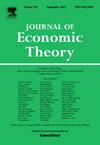歧义下的学习:一项实验研究
IF 1.2
3区 经济学
Q3 ECONOMICS
引用次数: 0
摘要
我们研究了在模棱两可的情况下的学习,在这种情况下,受试者对获胜事件下注,其概率取决于瓮中获胜筹码的未知比例。改变选择前的抽签次数可以让我们在不同数量的信息中“扫描”模棱两可的态度。除了匹配概率外,我们还分别引出后验信念,将学习对模糊性态度的影响从其对信念的影响中分离出来,包括与贝叶斯更新的分歧。“原始数据”和基于平滑模糊模型的分析都表明,学习对模糊态度的影响是向模糊中性方向发展的。此外,在小样本量下,这些变化对偏好的影响与贝叶斯更新的差异相当。本文章由计算机程序翻译,如有差异,请以英文原文为准。
Learning under ambiguity: An experimental investigation
We investigate learning in ambiguous situations where subjects bet on a winning event whose probability depends on an unknown proportion of winning chips in an urn. Varying the number of draws prior to choice allows us to “scan” ambiguity attitudes across differing amounts of information. By separately eliciting posterior beliefs in addition to matching probabilities, we disentangle the impact of learning on ambiguity attitude from its impact on beliefs, including divergences from Bayesian update. Both “raw data” and smooth ambiguity model-based analyses show that learning affects ambiguity attitude in the direction of ambiguity neutrality. Moreover, at small sample sizes, the impact of these changes on preferences is comparable to that of the divergence from Bayesian update.
求助全文
通过发布文献求助,成功后即可免费获取论文全文。
去求助
来源期刊

Journal of Economic Theory
ECONOMICS-
CiteScore
2.50
自引率
12.50%
发文量
135
期刊介绍:
The Journal of Economic Theory publishes original research on economic theory and emphasizes the theoretical analysis of economic models, including the study of related mathematical techniques. JET is the leading journal in economic theory. It is also one of nine core journals in all of economics. Among these journals, the Journal of Economic Theory ranks fourth in impact-adjusted citations.
 求助内容:
求助内容: 应助结果提醒方式:
应助结果提醒方式:


